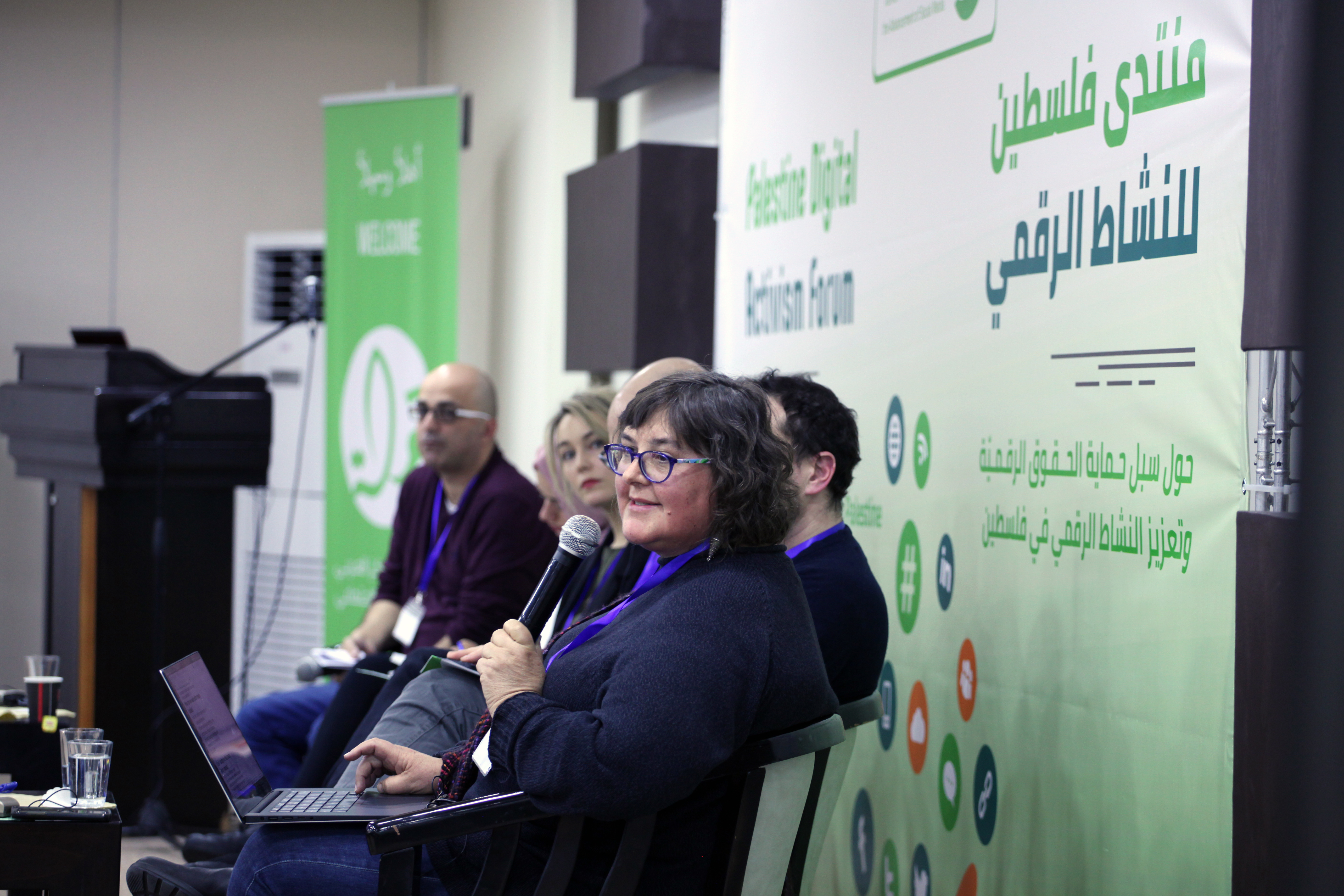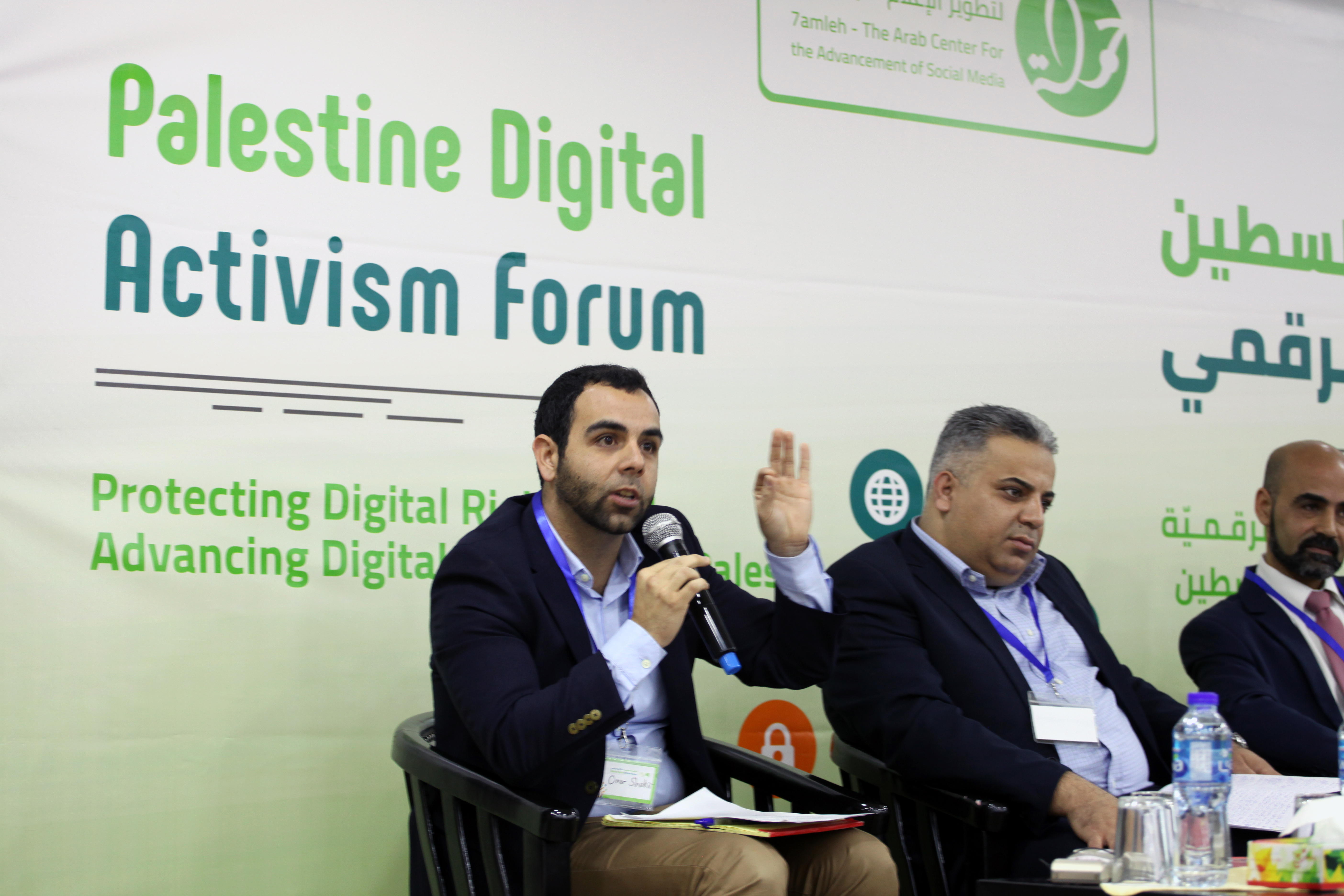At the Palestine Digital Activism Forum, representatives from both Google and Facebook faced a crowd that demanded to know why the two companies cooperate with Israel’s attempts at silencing Palestinians.

Not long after the Arab Spring began, social media companies rushed to embrace the popular narrative that their platforms had the potential to change societies and reform institutions. If the revolts across the Middle East and North Africa were any indication, the revolutions of the 21st century would not be televised but livestreamed, tweeted, shared, and liked.
Facebook founder and CEO Mark Zuckerberg wrote in a letter to potential investors the week the company went public—and almost exactly one year after Egyptian president Hosni Mubarak resigned—that “building tools to help people share can bring a more honest and transparent dialogue around government that could lead to more direct empowerment of people, more accountability for officials and better solutions to some of the biggest problems of our time.”
However, as social media companies grew in the years that followed, they shifted from bromides about social change to cooperating with governments, including authoritarian ones. What’s important now is the bottom line.
The shift in social media companies’ orientation to dissent was on full display in at the Palestine Digital Activism Forum on Wednesday, organized by 7amleh (pronounced Hamleh). Headquartered in Haifa, 7amleh, the Arab Center for Social Media Advancement, provides social media training for Palestinian activists in Israel, Gaza, and the West Bank, advocates for greater internet access and for the protection of Palestinian freedom of expression online, and runs campaigns of its own. Recent campaigns focused on restoring electricity to Gaza and opposing violence against the Palestinian LGBT community.
Several hundred people attended the forum, held at the Palestine Red Crescent Society in Ramallah–Al Bireh. The panelists included representatives from human rights groups, including Joshua Franco, a researcher at Amnesty International, Omar Shakir, director of Human Rights Watch – Palestine, Mahmoud Hassan, a lawyer at Addameer, and Dr. Issam Abdeen, Head of Regional and Local Advoacy at Al Haq, as well as representatives from Google and Facebook.
The representatives from Google and Facebook did not receive a warm welcome. The Q&A session following the panel on which they spoke, titled “Global Trends on Digital Rights: From International Perspectives to Palestinian Reality,” was contentious and tense. Attendees, sometimes angrily, demanded answers about Facebook’s cooperation with the Israeli government in taking down Palestinian accounts. Human rights advocates and activists expressed frustration with the arrests of hundreds of Palestinians for posts on Facebook. They wanted to know why Facebook officials had met with Israeli Justice Minister Ayelet Shaked and Strategic Affairs Minsiter Gilad Erdan, but not with their Palestinian counterparts, and why more Palestinian posts have been taken down than Israeli ones.

Aibhinn Kelleher, a Facebook product policy manager, and Thawab Shibly, a YouTube policy specialist for Google, offered the forum participants little more than rehearsed P.R. talking points. Gone was the celebration of disruption or any talk of social media’s potential to bring down repressive regimes.
Shibly, whose presentation gave tips on how to avoid having one’s YouTube video taken down for graphic or violent content, described Google’s rationale with a rare frankness. “We’d rather work with censoring governments like Turkey,” she said, “than get banned outright.”
Kelleher faced the majority of the hostile questions from the audience. She did not deny that Facebook was working with Israeli authorities, but asserted that it cooperates similarly with governments around the world. “We will only give governments user data in law enforcement cases,” she added, which is how Israel obtains Facebook user information and works with Facebook to remove posts deemed “incitement.”

Kelleher and Shibly explained their companies’ policies patiently, almost with a hint of remorse. Both stressed that their companies would be responsive to users’ complaints about disabled accounts and removed posts. “We are here to help, 24/7,” Kelleher said. “It’s not just a group of people making a decision you have no voice in,” Shibly added. “This is a process that you can participate in.”
Their reassurances reflected the changes in how big technology companies relate to social movements and human rights activism. Support for social media activism remains, but it is more tepid, even muted. The primary focus has shifted from powering the next grassroots revolt to protecting the bottom line, which means avoiding running afoul of repressive governments that could deny access to Google or Facebook.
Ironically, Erdan, Israel’s anti-BDS tsar, leveled a similar criticism at the two internet media giants from the Israeli side. The attendance of Google and Facebook representatives sparked a small controversy in Israeli media, which viewed their participation as implicit support for the boycott movement. “The internet companies have again proved that they prefer the lucre of money to setting ethical red lines and in fact aid organizations that delegitimize the existence Israel through use of their platforms,” Erdan said in response.

The hostility spread by Israeli media outlets in response to Google and Facebook’s attendance was absurd, Nadim Nashif, 7amleh’s director told me. “It’s a civic event, hosted by Palestinian civil society, people speaking with people, people speaking with companies, having a civic dialogue,” he said. “What’s the problem? Why can’t this happen? How can you even find arguments against this?”
“The media and the politicians in Israel have carried out a long process of dehumanization of Palestinians, so Palestinians are seen as creatures without any rights, not to say digital rights,” Nashif added. “So when they start talking about their lives, their realities, start speaking against the occupation, it’s incitement, they’re arrested, and their posts deleted.”
According to Facebook, the social media company restricted access to 472 posts at the request of the Israeli government. Omar Shakir, director of Human Rights Watch – Palestine said that over 400 Palestinians had been arrested for posts on social media. Recent high-profile cases of Palestinians arrested for their social media activity include those of Dareen Tatour and Nariman Tamimi.
Israel charged Tatour with incitement and expressing support for a terrorist organization after she published one of her poems on Facebook. Tatour has been under house arrest for over a year. Nariman Tamimi, Ahed Tamimi’s mother, is charged with incitement for streaming her daughter’s attempt to push two Israeli soldiers off of the patio of their family home on Facebook live. An Israeli military appeals court denied Nariman bail on Wednesday. She will remain in prison until the end of the trial.

